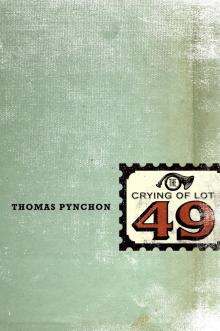- Home
- Thomas Pynchon
V. Page 8
V. Read online
Page 8
“Saw a fellow do that in a music hall once,” he rumbled. “You’re much better, Porpentine. Really.”
Porpentine extracted a cigarette and lay while smoking where he’d come to rest.
Up on the mezzanine the man with the blue eyeglasses peeked archly from behind a pillar, removed the nose, pocketed it and vanished.
A strange collection. There is more here, Yusef guessed. Had it to do with Kitchener and Marchand? Of course it must. But—His puzzling was interrupted by Meknes, who had returned to describe Yusef’s great-great-great-grandfather and grandmother as a one-legged mongrel dog who fed on donkey excrement and a syphilitic elephant, respectively.
III
The Fink restaurant was quiet: not much doing. A few English and German tourists—the penny-pinching kind whom it was never any use approaching—sat scattered about the room, making noise enough for midday in Place Mohammed Ali.
Maxwell Rowley-Bugge, hair coiffed, mustaches curled and external clothing correct to the last wrinkle and thread, sat in one corner, back to the wall, feeling the first shooting pains of panic begin to dance about his abdomen. For beneath the careful shell of hair, skin and fabric lay holed and gray linen and a ne’er-do-well’s heart. Old Max was a peregrine and penniless at that.
Give it a quarter of an hour more, he decided. If nothing promising comes along I shall move on to L’Univers.
He had crossed the border into Baedeker land some eight years ago—’90—after an unpleasantness in Yorkshire. It had been Ralph MacBurgess then—a young Lochinvar come down to the then wide enough horizons of England’s vaudeville circuits. He sang a bit, danced a bit, told a number of passable barnyard jokes. But Max or Ralph had a problem; being perhaps too daft for small girls. This particular girl, Alice, had shown at age ten the same halfway responses (a game, she’d carol—such fun) of her predecessors. But they know, Max told himself: no matter how young, they know what it is, what they’re doing. Only they don’t think about it that much. Which was why he drew the line at sixteen or so—any older and romance, religion, remorse entered like blundering stagehands to ruin a pure pas de deux.
But this one had told her friends, who became jealous—one at least enough to pass it on to the clergyman, parents, police—O God. How awkward it had been. Though he’d not tried to forget the tableau—dressing room in the Athenaeum Theatre, a middle-sized town called Lardwick-in-the-Fen. Bare pipes, worn sequined gowns hung in a corner. Broken hollow-pasteboard pillar for the romantic tragedy the vaudeville had replaced. A costume box for their bed. Then footsteps, voices, a knob turning so slow. . . .
She’d wanted it. Even afterward, dry-eyed among a protective cordon of hating faces, the eyes had said: I still want it. Alice, the ruin of Ralph MacBurgess. Who knew what any of them wanted?
How he had come to Alexandria, where he would go on leaving, little of that could matter to any tourist. He was that sort of vagrant who exists, though unwillingly, entirely within the Baedeker world—as much a feature of the topography as the other automata: waiters, porters, cabmen, clerks. Taken for granted. Whenever he was about his business—cadging meals, drinks, or lodging—a temporary covenant would come into effect between Max and his “touch”; by which Max was defined as a well-off fellow tourist temporarily embarrassed by a malfunction in Cook’s machinery.
A common game among tourists. They knew what he was; and those who participated in the game did so for the same reason they haggled at shops or gave baksheesh to beggars: it was in the unwritten laws of Baedeker land. Max was one of the minor inconveniences to an almost perfectly arranged tourist-state. The inconvenience was more than made up for in “color.”
Fink’s now began a burst into life. Max looked up with interest. Merrymakers were coming across rue de Rosette from a building which looked like an embassy or consulate. Party there must have only now broken up. The restaurant was filling rapidly. Max surveyed each newcomer, waiting for the imperceptible nod, the high-sign.
He decided at last on a group of four: two men, a small girl and a young lady who like the gown she wore seemed awkwardly bouffant and provincial. All English, of course. Max had his criteria.
He also had an eye, and something about the group disturbed him. After eight years in this supranational domain he knew a tourist when he saw one. The girls were almost certain—but their companions acted wrong: lacking a certain assurance, an instinctive way of belonging to the touristic part of Alex common to all cities, which even the green show their first time out. But it was getting late and Max had nowhere to stay tonight, nor had he eaten.
His opening line was unimportant, being only a choice among standard openers, each effective as long as the touches were eligible to play. It was the response that counted. Here it came out close to what he’d guessed. The two men, looking like a comedy team: one fair and fat, the other dark, red-faced and scrawny, seemed to want to play the gay dog. Fine, let them. Max knew how to be gay. During the introductions his eyes may have stayed a half-second too long on Mildred Wren. But she was myopic and stocky; nothing of that old Alice in her at all.
An ideal touch: all behaved as if they’d known him for years. But you somehow felt that through some horrible osmosis the word was going to get round. Wing in on the wind to every beggar, vagrant, exile-by-choice and peregrine-at-large in Alex that the team of Porpentine & Goodfellow plus the Wren sisters were sitting at a table in the Fink. This whole hard-up population might soon begin to drift in one by one, each getting the same sort of reception, drawn into the group cordially and casually as a close acquaintance who had left but a quarter of an hour before. Max was subject to visions. It would go on, into tomorrow, the next day, the next: they would keep calling for waiters in the same cheery voices to bring more chairs, food, wine. Soon the other tourists would have to be sent away: every chair in the Fink would be in use, spreading out from this table in rings, like a tree trunk or rain puddle. And when the Fink’s chairs ran out the harassed waiters would have to begin bringing more in from next door and down the street and then the next block, the next quarter; the seated beggars would overflow into the street, it would swell and swell . . . and the conversation would grow to enormity, each of the thousands participating bringing to it his own reminiscences, jokes, dreams, looninesses, epigrams . . . an entertainment! A grand vaudeville! They’d sit like that, eating when hunger came, getting drunk, sleeping it off, getting drunk again. How would it end? How could it?
She’d been talking, the older girl—Victoria—white Vöslauer gone perhaps to her head. Eighteen, Max guessed, slowly giving up his vision of vagrants’ communion. About the age Alice would be, now.
Was there a bit of Alice there? Alice was of course another of his criteria. Well the same queer mixture, at least, of girl-at-play, girl-in-heat. Blithe and so green. . . .
She was Catholic; had been to a convent school near her home. This was her first trip abroad. She talked perhaps overmuch about her religion; had indeed for a time considered the Son of God as a young lady will consider any eligible bachelor. But had realized eventually that of course he was not but maintained instead a great harem clad in black, decked only with rosaries. Unable to stand for any such competition Victoria had therefore left the novitiate after a matter of weeks but not the Church: that with its sadfaced statuary, odors of candles and incense, formed along with an uncle Evelyn the foci of her serene orbit. The uncle, a wild or renegade sundowner, would arrive from Australia once every few years bringing no gifts but his wonderful yarns. As far as Victoria remembered, he’d never repeated himself. More important perhaps, she was given enough material to evolve between visits a private back of beyond, a colonial doll’s world she could play with and within constantly: developing, exploring, manipulating. Especially during Mass: for here was the stage or dramatic field already prepared, serviceable to a seed-time fancy. So it came about that God wore a wideawake hat and fought skirmishes w
ith an aboriginal Satan out at the antipodes of the firmament, in the name and for the safekeeping of any Victoria.
Now Alice—it had been “her” clergyman, had it not?—she was C of E, sturdy-English, future mother, apple cheeks, all that. What is wrong with you Max, he asked himself. Come out of that costume box, that cheerless past. This one’s only Victoria, Victoria . . . but what was there about her?
Normally in gatherings like this Max could be talkative, amusing. Not so much by way of paying for his meal or kip as to keep fit, retain the fine edge, the knack for telling a good yarn and gauging his own rapport with the audience in case, in case. . . .
He could go back into the business. There were touring companies abroad: even now, eight years aged, eyebrow-line altered, hair dyed, the mustache—who’d know him? What need for exile? The story had spread to the troupe and through them to all small-urban and provincial England. But they’d all loved him, handsome, jolly Ralph. Surely after eight years, even if he were recognized. . . .
But now Max found not much to say. The girl dominated the conversation, and it was the kind of conversation Max had no knack for. Here were none of your postmortems on the day past—vistas! tombs! curious beggars!—no bringing out of small prizes from the shops and bazaars, no speculation on tomorrow’s itinerary; only a passing reference to a party tonight at the Austrian Consulate. Here instead was unilateral confession, and Mildred contemplating a rock with trilobite fossils she’d found out near the site of the Pharos, and the other two men listening to Victoria but yet off somewhere else switching glances at each other, at the door, about the room. Dinner came, was eaten, went. But even with a filled belly Max could not cheer up. They were somehow depressing: Max felt disquieted. What had he walked into? It showed bad judgment, settling on this lot.
“My God,” from Goodfellow. They looked up to see, materialized behind them, an emaciated figure in evening dress whose head appeared to be that of a nettled sparrow-hawk. The head guffawed, retaining its fierce expression. Victoria bubbled over in a laugh.
“It’s Hugh!” she cried, delighted.
“Indeed,” came a hollow voice from inside somewhere.
“Hugh Bongo-Shaftsbury,” said Goodfellow, ungracious.
“Harmakhis.” Bongo-Shaftsbury indicated the ceramic hawk’s head. “God of Heliopolis and chief deity of Lower Egypt. Utterly genuine, this: a mask, you know, used in the ancient rituals.” He seated himself next to Victoria. Goodfellow scowled. “Literally Horus on the horizon, also represented as a lion with the head of a man. Like the Sphinx.”
“Oh,” Victoria said (that languid “oh”), “the Sphinx.”
“How far down the Nile do you intend to go,” asked Porpentine. “Mr. Goodfellow has mentioned your interest in Luxor.”
“I feel it is fresh territory, sir,” Bongo-Shaftsbury replied. “No first-rate work around the area since Grébaut discovered the tomb of the Theban priests back in ’91. Of course one should have a look round the pyramids at Gizeh, but that is pretty much old hat since Mr. Flinders Petrie’s painstaking inspection of sixteen or seventeen years ago.”
Now what was this, Max wondered. An Egyptologist was he, or only reciting from the pages of his Baedeker? Victoria poised prettily between Goodfellow and Bongo-Shaftsbury, attempting to maintain a kind of flirtatious equilibrium.
On the face of it, all normal. Rivalry for the young lady’s attentions between the two, Mildred a younger sister, Porpentine perhaps a personal secretary; for Goodfellow did have the affluent look. But beneath?
He came to the awareness reluctantly. In Baedeker land one doesn’t often run across impostors. Duplicity is against the law, it is being a Bad Fellow.
But they were only posing as tourists. Playing a game different from Max’s; and it frightened him.
Talk at the table stopped. The faces of the three men lost whatever marks of specific passion they had held. The cause was approaching their table: an unremarkable figure wearing a cape and blue eyeglasses.
“Hullo Lepsius,” said Goodfellow. “Tire of the climate in Brindisi, did you?”
“Sudden business called me to Egypt.”
So the party had already grown from four to seven. Max remembered his vision. What quaint manner of peregrine here: these two? He saw a flicker of communication between the newcomers, rapid and nearly coinciding with a similar glance between Porpentine and Goodfellow.
Was that how the sides were drawn up? Were there sides at all?
Goodfellow sniffed at his wine. “Your traveling companion,” he said at last. “We’d rather hoped to see him again.”
“Gone to a Switzerland,” said Lepsius, “of clean winds, clean mountains. One can have enough, one day, of this soiled South.”
“Unless you go far enough south. I imagine far enough down the Nile one gets back to a kind of primitive spotlessness.”
Good timing, Max noted. And the gestures preceded the lines as they should. Whoever they were it was none of your amateur night.
Lepsius speculated: “Doesn’t the law of the wild beast prevail down there? There are no property rights. There is fighting. The victor wins all. Glory, life, power and property; all.”
“Perhaps. But in Europe, you know, we are civilized. Fortunately jungle law is inadmissible.”
Odd: neither Porpentine nor Bongo-Shaftsbury spoke. Each had bent a close eye on his own man, keeping expressionless.
“Shall we meet again in Cairo then,” said Lepsius.
“Most certainly”; nodding.
Lepsius took his leave then.
“What a queer gentleman,” Victoria smiled, restraining Mildred, who’d cocked an arm preparing to heave her rock at his retreating form.
Bongo-Shaftsbury turned to Porpentine. “Is it queer to favor the clean over the impure?”
“It may depend on one’s employment,” was Porpentine’s rejoinder: “and employer.”
Time had come for the Fink to close up. Bongo-Shaftsbury took the check with an alacrity which amused them all. Half the battle, thought Max. Out in the street he touched Porpentine’s sleeve and began an apologetic denunciation of Cook’s. Victoria skipped ahead across rue Chérif Pacha to the hotel. Behind them a closed carriage came rattling out of the drive beside the Austrian Consulate and dashed away hell-for-leather down rue de Rosette.
Porpentine turned to watch it. “Someone is in a hurry,” Bongo-Shaftsbury noted.
“Indeed,” said Goodfellow. The three watched a few lights in the upper windows of the consulate. “Quiet, though.”
Bongo-Shaftsbury laughed quickly, perhaps a bit incredulous.
“Here. In the street . . .”
“A fiver would see me through,” Max had continued, trying to regain Porpentine’s attention.
“Oh,” vague, “of course, I could spare it.” Fumbling naively with his wallet.
Victoria watched them from the curb opposite. “Do come along,” she called.
Goodfellow grinned. “Here, m’dear.” And started across with Bongo-Shaftsbury.
She stamped her foot. “Mr. Porpentine.” Porpentine, five quid between his fingertips, looked around. “Do finish with your cripple. Give him his shilling and come. It’s late.”
The white wine, a ghost of Alice, first doubts that Porpentine was genuine; all could contribute to a violation of code. The code being only: Max, take whatever they give you. Max had already turned away from the note which fluttered in the street’s wind, moved off against the wind. Limping toward the next pool of light he sensed Porpentine still looked after him. Also knew what he must look like: a little halt, less sure of his own memories’ safety and of how many more pools of light he could reasonably expect from the street at night.
IV
The Alexandria and Cairo morning express was late. It puffed into the Gare du Caire slow, nois
y, venting black smoke and white steam to mingle among palms and acacias in the park across the tracks from the station house.
Of course the train was late. Waldetar the conductor snorted good-naturedly at those on the platform. Tourists and businessmen, porters from Cook’s and Gaze’s, poorer, third-class passengers with their impedimenta—like a bazaar—: what else did they expect? Seven years he’d made the same leisurely run, and the train had never been on time. Schedules were for the line’s owners, for those who calculated profit and loss. The train itself ran on a different clock—its own, which no human could read.
Waldetar was not an Alexandrian. Born in Portugal, he now lived with a wife and three children near the railroad yards in Cairo. His life’s progress had been inevitably east; having somehow escaped the hothouse of his fellow Sephardim he flew to the other extreme and developed an obsession with ancestral roots. Land of triumph, land of God. Land of suffering, also. Scenes of specific persecution upset him.
But Alexandria was a special case. In the Jewish year 3554 Ptolemy Philopator, having been refused entrance to the temple at Jerusalem, returned to Alexandria and imprisoned many of the Jewish colony there. Christians were not the first to be put on exhibition and mass-murdered for the amusement of a mob. Here Ptolemy, after ordering Alexandria’s Jews confined in the Hippodrome, embarked on a two-day debauch. The king, his guests and a herd of killer elephants fed on wine and aphrodisiacs: when all had been worked up to the proper level of blood-lust, the elephants were turned loose into the arena and driven upon the prisoners. But turned (goes the tale) on the guards and spectators instead, trampling many to death. So impressed was Ptolemy that he released the condemned, restored their privileges, and gave them leave to kill their enemies.
Waldetar, a highly religious man, had heard the story from his father and was inclined to take the common-sense view. If there is no telling what a drunken human will do, so much less a herd of drunken elephants. Why put it down to God’s intervention? There were enough instances of that in history, all regarded by Waldetar with terror and a sense of his own smallness: Noah’s warning of the Flood, the parting of the Red Sea, Lot’s escape from annihilated Sodom. Men, he felt, even perhaps Sephardim, are at the mercy of the earth and its seas. Whether a cataclysm is accident or design, they need a God to keep them from harm.

 Mason & Dixon
Mason & Dixon Against the Day
Against the Day Uncollected Works
Uncollected Works Bleeding Edge
Bleeding Edge Gravity's Rainbow
Gravity's Rainbow The Crying of Lot 49
The Crying of Lot 49 V.
V. Inherent Vice
Inherent Vice Vineland
Vineland